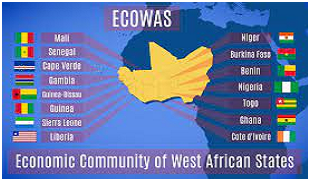The president of the ECOWAS Commission, Omar Alieu Touray, signed grant agreements with 15 training centers to build capacity on Agroecology in Member States as part of the implementation of the ECOWAS Agroecology Program funded by the European Union.
The ECOWAS region spans an area of 5.2 million square kilometers and its Member States are Benin, Burkina Faso, Cabo Verde, Côte d’Ivoire, The Gambia, Ghana, Guinea, Guinea Bissau, Liberia, Mali, Niger, Nigeria, Sierra Leone, Senegal and Togo.
The total budget of the grant agreements is €1,320,784.43 representing about €88,000 per center and for an average duration of 18 months aimed at training 12,000 young persons in the Region.
The purpose of each grant is to establish the framework of collaboration between ECOWAS and the recipient Centre for the implementation of the Program activities in West Africa with the general objective of building the human resource and environmentally friendly system that will sustain and increase agricultural productivity and create resilient rural society.
Selected following due consultation and assessment process, the 15 training centers represent one per Member State.
In supporting the centers through the agreements, ECOWAS seeks to improve the quality of training and the development of the centers capacities on topical issues related to agroecology and to increase the annual number of people trained in agroecology.
The total target of the program is about 12,000 young people including men and women to be trained by 2024 in agroecology in the region.
More specifically, the objective of the support is to contribute to strengthening the training capacities of the centers in the promotion of quality training systems integrating application of theoretical and practical lessons on agroecological techniques and good practices according to the environment, the increase in the number of young people trained, in particular rural people, and their networking in the long term, facilitating their connection with support organizations/partners for possible financing in the scaling up of agroecological practices.
ECOWAS support to training centers falls within the objective of the program to facilitate networking and dissemination of pilot experiences and promising approaches in agroecology (with the Songhai Centre in Benin and the CIDAP Centre in Togo as reference centers) in other countries in the sub-region, particularly in the Sahel.
To recall, the ECOWAS Agroecology Program aims to stimulate the development of innovative practices that optimize the mobilization of ecological processes in the field of agrosylvopastoral and fisheries production in the ECOWAS zone by supporting family farms towards an agroecological transition that enables them to reconcile economic performance, food security, environmental preservation, and the health of the population.
With a total budget of 16.2 million euros, it is composed of two projects, namely the Support Project for Agroecological Transition in West Africa (PATAE), funded by the French Development Agency (FDA) at 8 million euros and the Support Project for the Dissemination and Implementation of Good Practices for Sustainable Agricultural Intensification (PAIAD) funded by the European Union at 8.2 million euros. It covers the 15 ECOWAS Member States and is scheduled to end in 2024.
The ECOWAS was established when the ECOWAS Treaty was signed by 15 West African Heads of State and Government on May 28, 1975 in Lagos, Nigeria.
Considered one of the pillars of the African Economic Community, ECOWAS was set up to promote co-operation and integration, leading to the establishment of an economic union in West Africa to raise the living standards of its peoples, and to maintain and enhance economic stability, foster relations-among Member States and contribute to the progress and development of the African continent.
In 2007, ECOWAS Secretariat was transformed into a Commission and the Commission is headed by the president, assisted by a Vice president, and five Commissioners, comprising experienced bureaucrats who are providing the leadership in this new orientation.
As part of this renewal process, ECOWAS is implementing critical and strategic programs that will deepen cohesion and progressively eliminate identified barriers to full integration.
In this way, the estimated 300 million citizens of the community can ultimately take ownership for the realization of the new vision of moving from an ECOWAS of States to an “ECOWAS of the People: Peace and Prosperity to All” by 2050.


